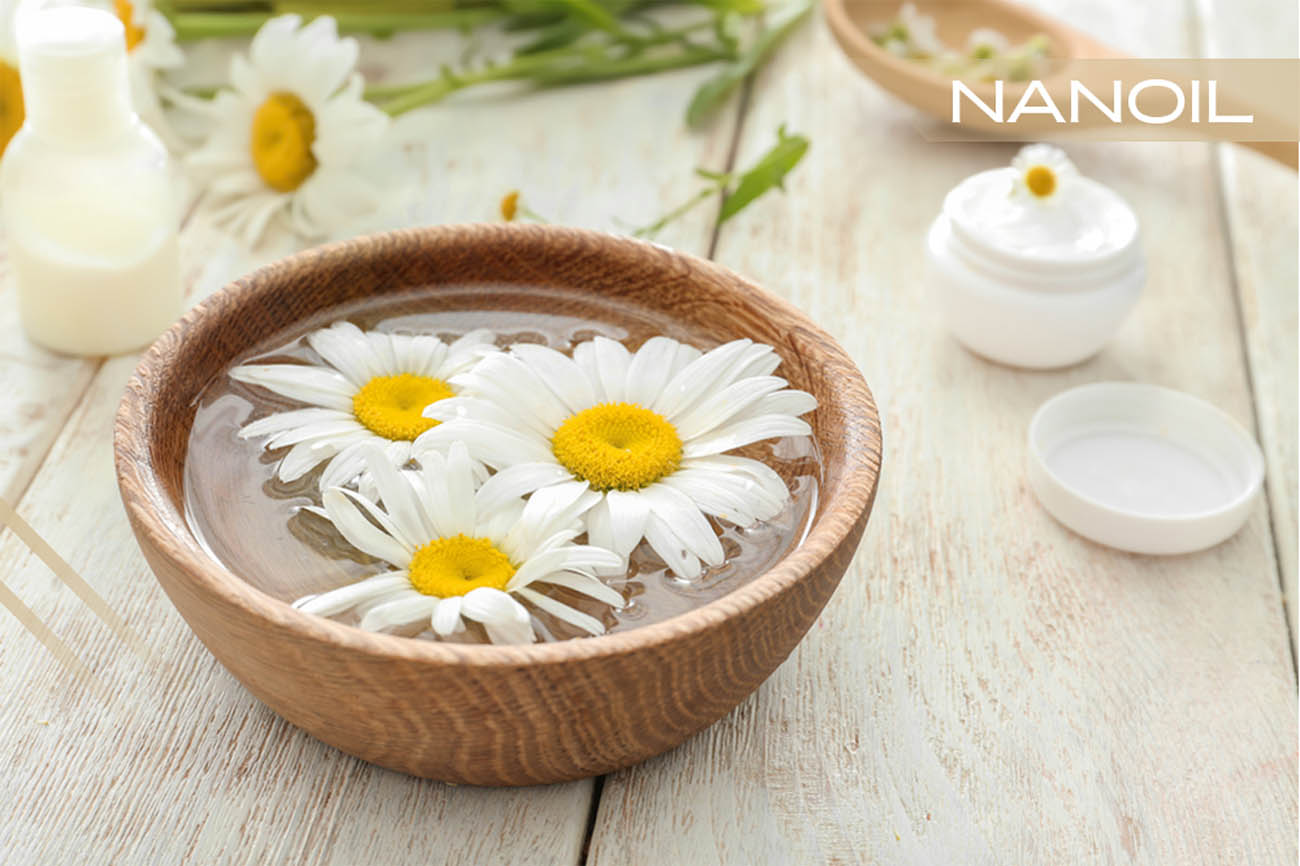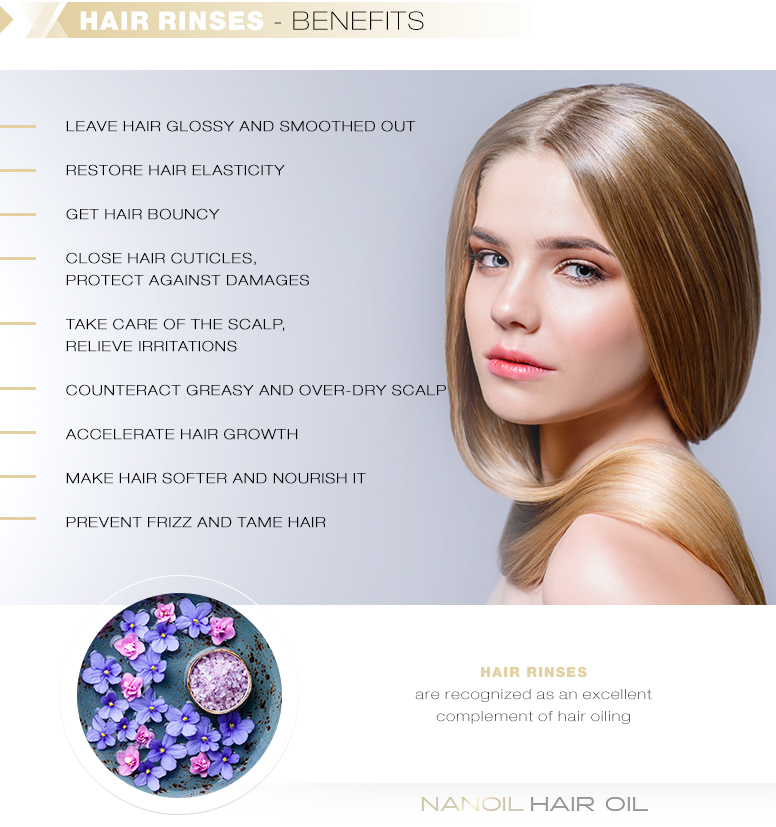- NANOIL Products
- Oils
- Face serums
- Hair masks
- Shampoos
- Hair conditioners
- Hair styling
- Care
- Hair Porosity Test
- Blog
- Contact

Do you benefit from hair oil treatment? If so, enrich this beauty ritual with hair rinses. Soon it might appear to be your favourite 'finishing touch' of the entire hair conditioning procedure - it's just like the last chapter of a remarkable book. Although hair rinses don't look fancy, their action is truly incredible. The outcomes brought out are visible almost overnight: strands win healthy shine, elasticity and are smooth again. It’s worth realising that hair isn't the only one to take advantage of hair rinse. It appears that when treated with hair rinses regularly, scalp becomes soothed and healed, too. The best thing about hair rinses is that they can be prepared in a snap by using only easy-accessible products, which in most cases are already in our cupboards.
Hair rinses are infusions and water-based mixtures used to rinse hair with after washing it (applied as the last stage after removing shampoo lather). In short, hair rinse has to be poured over clean hair and left till the next hair washing. It's a water-like, lightweight solution that doesn't leave hair overburdened and works similarly to a hair conditioner. Last but not least, hair rinses can be composed of one or a few ingredients.
When applied regularly, hair rinses gift strands with shine, elasticity and lightweightness. Moreover, hair becomes smoothed, tamed and its colour intensifies significantly. Also, hair rinses accelerate hair growth, deal with dandruff and soothe scalp irritations. Additionally, they are recognized as an excellent complement of hair oiling. Why is that? In most cases, the substances used for the production of hair rinses differ from the substances naturally occurring in natural oils. As a consequence, the composition of hair rinses is completely different than oil blends since the components are diversified. To put it another way, owing to the application of hair rinses, we supply strands with all the beneficial substances that oils are normally devoid of.

Hair rinses can be applied after precise hair washing yet the best time to make use of them is right after hair oil treatment because they complement the properties of natural oils and boost this beauty ritual's effectiveness. Basically, using hair rinses is like putting the finishing touch to hair care ritual. They help hair regain its lost lightweightness. As a result, hair is raised at the roots and this prevents hair overburdening due to regular hair care practices. Another advantage to mention, hair rinses are recognized as an effective remedy for static and frizzy hair. Hence, they should be included into and considered as an integral part of everyday hair care, especially in the winter season.
Hair rinses can be applied in two ways:
Before exposing strands to hair rinse treatment, they should be damp, yet not soaking wet. Therefore, remember to delicately towel the hair before the procedure. Mind you, the absorption rate of dry hair is definitely lower. In other words, hair will 'drink' less nourishing substances composing hair rinse unless being slightly damp.
It's a hair rinse which work wonders both to hair and scalp because it stimulates microcirculatory blood flow. Owing to this quality of the hair rinse, hair growth is accelerated. Furthermore, coffee hair rinse is responsible for delivering gloss to hair, nourishes and makes strands noticeably softer. Indeed, coffee aroma is intensive and lingers on hair really long. Last but not least, this homemade hair rinse is destined for brown and black hair because it makes strands even darker by intensifying the natural colour.
This homemade hair rinse is a perfect method to smooth hair out instead of using a flat iron or a serum with a high silicone content. Vinegar acidifies which translates into closing hair cuticles. The outcome takes the form of shining and smoothed hair that is really pleasant to the touch.
It's worth realizing that vinegar hair rinses are perfect for people who frequently dye their hair. Owing to closing hair cuticles regularly, which stands for smoothing out hair structure, the colour stays true for significantly longer and hair porosity level is lowered.
Mind you, it's typical for vinegar hair rinse to leave hair slightly matte, therefore it must be remembered not to acidify the hair rinse too much. In other words, don't use more vinegar than it is required.
Hop has been long known and recognized as a natural conditioner. It makes hair soft, keeps it in good condition, helps it remain bouncy and full of volume. Moreover, beer contains alcohol that boosts blood circulation in scalp so it stimulates hair bulbs to more efficient work. At the same time, beer is able to free scalp from the excess of toxins and seborrhoea. When thinned with water, it becomes a gentle, yet effective hair care agent.
Beer hair rinse positively affects fatigued, volume-deprived hair with tendency of getting greasy. After all, beer contains a huge amount of B-group vitamins.
Linseed is a beauty hit that serves well in hair, face, nail and body care treatments. Its merits in the field of regeneration, nourishment and moisturisation are priceless. It turns out that linseed gel can be successfully used to prepare hair rinse which aim is to nourish and leave matte hair glossy. It conditions frizzy and unruly hair too.
This is a gentle hair rinse that relieves skin irritations and, simultaneously, enhances hair shine and fair reflexes on blond hair. What's more, chamomile displays lightening up properties and this quality makes it a potent agent preventing blonde hair from getting yellowish.
Mint is known for its scalp cleansing properties. In short, it removes toxins and the excess of sebum. Additionally, mint is able to lift hair up at its roots and gift strands with volume. Therefore, if your scalp is irritation-prone, you should turn to the potent agent relieving irritations and soothing itchiness such as mint.
It's really hard to maintain saturation of red-coloured hair. Simply, it's fast to fade away. As a consequence, instead of being deep copper-coloured, it turns into blemishing orange shade. How to intensify ginger hair colour?
This hair rinse, alike coffee hair rinse, intensifies the colour of dark hair. When applied in a regular basis, it doesn't only bring out the colour but also takes care of dyed hair. To clarify, it prevents fast colour fade.
This is a two-ingredient hair rinse that is exceptionally easy to prepare, you don't have to infuse any herbs. Instead, you have to mix birch sap (you can buy it in a shop) with distilled water. Birch sap contains an array of vitamins, amino acids and mineral salts that reinforce hair bulbs, leave scalp fresh, combat dandruff as well as regenerate and intensify hair gloss. Birch sap hair rinse serves well as anti-hair loss treatment. After washing your hair, use the birch sap hair rinse and let the strands become air-dry afterwards.
In order to enhance the action delivered by homemade hair rinses, always use preboiled water. It isn't as hard as tap water, therefore hair exposed to distilled water becomes far softer and more elastic. Also, it will be easier to style such hair as it becomes tamed and pleasant to the touch.
Comments: #0